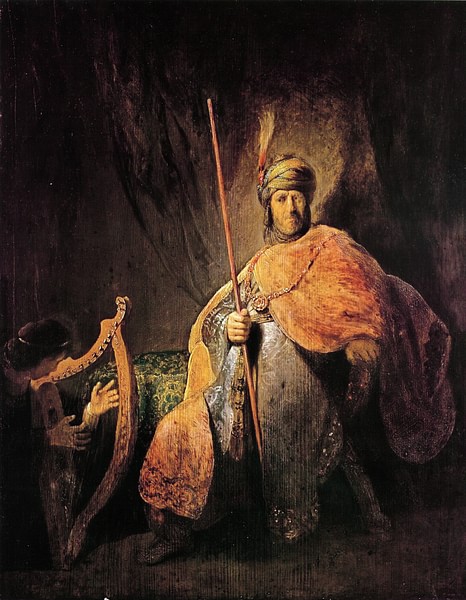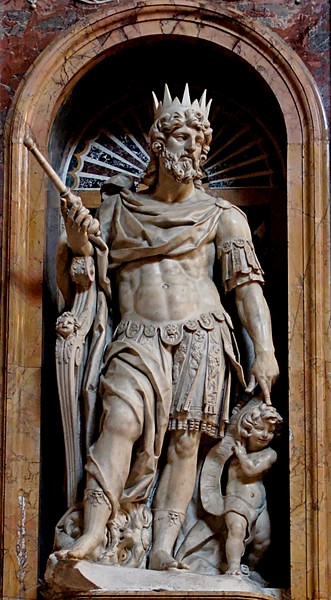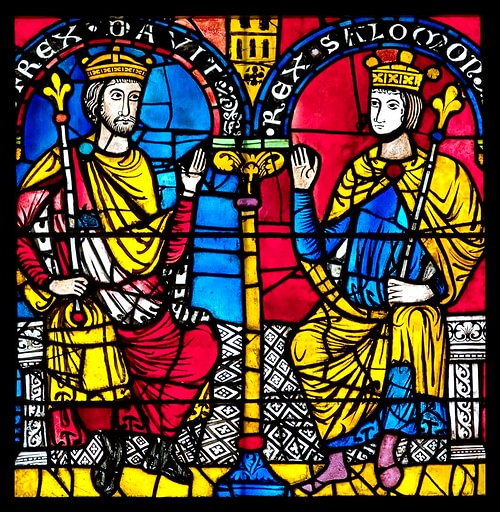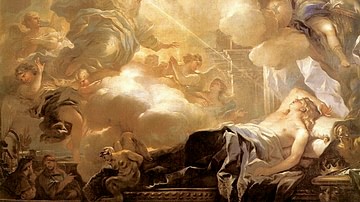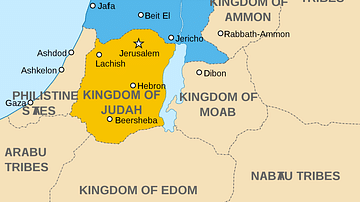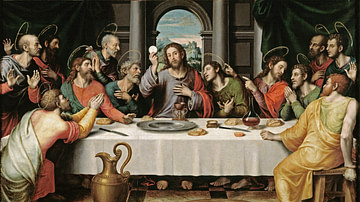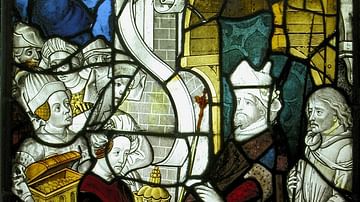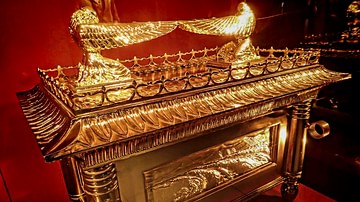
According to biblical tradition (and some say myth), David (c. 1035-970 BCE) was the second king in the ancient United Kingdom of Israel who helped establish the eternal throne of God. A former shepherd, David was renowned for his passion for God, his touching psalms and musical abilities, his inspiring courage and expertise in warfare, his good looks and illicit relationship with Bathsheba, and his ancestral connections to Jesus of Nazareth in the New Testament. Born around 1000 BCE, David was the eighth son (and youngest) of Jesse, from the tribe of Judah. Like King Saul and King Solomon, David reigned for 40 years in one of the highest and most prosperous periods in Israel's history – called by many, “The Golden Age” of Israel. Although presented just as flawed or sinful as the kings who preceded and followed him, in Judaism and Christianity, King David is presented in various books of the Bible (from where most information originates on him, currently) as a model king of piety, repentance, and submission as well a forerunner to the Messiah – the Jewish "anointed one" and champion.
The Traditional Story of King David
In the Hebrew scriptures, 1 Samuel 16 introduces readers to a young man who will capture not only the heart of the nation of Israel, but also the heart of God. The Old Testament Prophet Samuel (c. 1200-1050 BCE) is sent to Jesse of Bethlehem (a common farmer and shepherd) to anoint one of his sons as the new king – while Israel's first king, Saul (c. 1080-1010 BCE), is still living but failing in his duties to follow Samuel's instructions and rebelling against the authority/commandments of God. After Jesse parades nearly all his sons by Samuel, each one rejected as king, he finally brings his youngest – David, who “was glowing with health and had a new appearance and handsome features” (1 Samuel 16:12).
Although David does not look like a king should look, he has the heart of a lion – a courageous spirit – and even more, a deep, unending love for God. Samuel, who has been so depressed over King Saul, finds hope and blessing in the young shepherd from Bethlehem in Judea. After David was anointed, 1 Samuel 16:13 states, “and from that day on the Spirit of the Lord came powerfully upon David.”
The news for King Saul, however, is not at all positive. While David receives the blessings of the Holy Spirit (the Counselor and third person of the Trinity), “the Spirit of the Lord had departed from Saul, and an evil spirit from the Lord tormented him” (v. 16:14). Saul began to experience periods of mental and emotional suffering, brought on by either a bipolar disorder or an evil spirit (according to the biblical text). One of his servants remembers that David is an excellent musician and recommends Saul employ him as an armor-bearer (the one who carried a large shield and other weapons for the king) and a musical balm of sorts for his tortuous episodes. 1 Samuel 16:23 states, “Whenever the spirit from God came on Saul, David would take up his lyre and play. Then relief would come to Saul; he would feel better, and the evil spirit would leave him.”
David & Goliath
David was more than just a musician; he had the heart of a warrior and a set of shepherding skills on the masters' level, especially when it came to the use of the sling. One day, the Philistines and the Israelites were at war; however, the two war parties were on either side of a valley, taunting each other. The Philistines, the non-Semitic people of ancient southern Palestine, had a powerful warrior in their midst, though – Goliath, who (according to the Bible) was nearly ten feet (3 m) tall. Not surprisingly, none of the Israelite warriors dared to fight him.
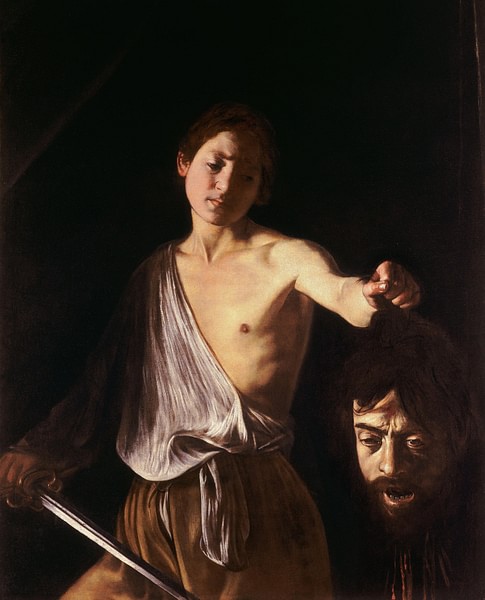
When David hears Goliath's vile words against Israel and God, he volunteers to battle him. Rather than insist that an older, more experienced officer (or even himself) go out to defend God and Israel against Goliath, King Saul endorses David's wishes. After some wardrobe changes (eventually donning his normal garb), David selects five river stones for ammunition and sets out to face his giant enemy. Goliath stares down at the small, young man, and chides, “Am I a dog, that you come at me with sticks?” (v. 17:43). David's verbal response is as mocking as it is audacious:
You come against me with sword and spear and javelin, but I come against you in the name of the Lord Almighty, the God of the armies of Israel, whom you have defied. This day the Lord will deliver you into my hands, and I'll strike you down and cut off your head. This very day I will give the carcasses of the Philistine army to the birds and the wild animals, and the whole world will know that there is a God in Israel.
(vv. 17:45–46)
As Goliath charges toward David, the young man slings a stone, which hits Goliath square in the forehead, knocking him out. David then stands over the giant, grabs the giant's sword, and kills him. Seeing the youngest of Israel so easily dispatch their strongest warrior sent terror through the entire Philistine army and they fled. It also pleased King Saul who basically adopted him into his family. 1 Samuel 18:2–3 states, “From that day Saul kept David with him and did not let him return home to his family.”
The Envy of Saul
In consideration of David's frequent success and amazing skills in his service, King Saul promoted David, who continued to amaze his men and all Israel. Unfortunately, Saul had developed an ego problem, so he begins to resent David especially when he hears people singing, “Saul has slain his thousands, and David his tens of thousands” (v. 18:7). In bitter envy, Saul tries to kill David, whom he now sees as the enemy instead of a loyal servant. Thus, the arrangement of a marriage between Saul's daughter Michal and David is more about Saul's desire to ensnare or ultimately assassinate David than a holy union, ironically.
Eventually, David goes to his best friend, Jonathan, who is also King Saul's eldest son, for help. Jonathan tries to downplay David's fears, but when Jonathan goes to his father to reassure him that David is his loyal servant, King Saul lashes out at Jonathan, calling him,
You son of a perverse and rebellious woman! Don't I know that you have sided with the son of Jesse to your own shame and to the shame of the mother who bore you?
(v. 20:30)
It is then that Jonathan finally comprehends how insane his father is with hatred for David. Saul has come to hate David more than he loves God—never a good condition to be in, biblically.
To the end of his life, Saul's son Prince Jonathan becomes David's protector, pleading for that same devotion from David. 1 Samuel 20:16–17 states, “So Jonathan made a covenant with the house of David, saying, 'May the Lord call David's enemies to account.' And Jonathan had David reaffirm his oath out of love for him, because he loved him as he loved himself.”
The rest of 1 Samuel provides the details of an ongoing cat-and-mouse chase between Saul, who is desperately trying to kill David (and his forces) and David, who is desperately trying not to kill Saul, despite the urging of his friends and countrymen. Instead, David shows his noble, compassionate, committed character that God finds so impressive. Despite Saul's wickedness, David does not want to harm Saul, “God's anointed.” Saul, on the other hand, has given in to the darkness of his heart and soul, even going so far as to kill some priests of the Lord.
In fact, David goes out of his way to avoid Saul and/or repays Saul's evil with good. One of the more interesting moments occurs when David sneaks into a cave where Saul is relieving himself and cuts off a corner of Saul's robe to show him that if David wanted to kill him, Saul would already be dead. Once a distance away, David cries out,
See, my father, look at this piece of your robe in my hand! I cut off the corner of your robe but did not kill you. See that there is nothing in my hand to indicate that I am guilty of wrongdoing or rebellion. I have not wronged you, but you are hunting me down to take my life.
(v. 24:11)
Once King Saul realized what has just happened, he weeps bitterly, finally self-aware that he has been unrighteous, blood-thirsty, and ungodly, whereas David has properly and mercifully showed himself to be worthy of being Israel's next king. Before they part, Saul asks David to swear that he will not kill off Saul's children, which David easily does.
Saul's madness still rages inside him, sadly, and continues to pursue David who, in another moment of opportunity, spares Saul's life. The whole of Israel mourns, though, at the death of Samuel, and Saul, knowing that sorcery and witchcraft is forbidden by the Law, goes to Endor to conjure up Samuel. Although Saul begs for help from the spirit of Samuel, the dead prophet only replies, “Why do you consult me, now that the Lord has departed from you and become your enemy?” (v. 28:16). Saul collapses, a broken and self-ruined man who only heaped innocent bloodshed atop his arrogant, disobedient acts.
The book ends with David enjoying more and more success on the battlefield and in his domestic life, but for Saul and his family, the tide will turn and run red at their last battle with the Philistines at Mount Gilboa. In one day, the entire royal line of Saul is lost in battle, with all Saul's sons dying before him, including the noble and beloved Jonathan. Saul is critically wounded, and pleads for a nearby Israelite soldier to kill him, afraid of torture or molestation if he is found alive.
The ending of the book is distressing. 1 Samuel 31:4–6 states,
But his armor-bearer was terrified and would not do it; so, Saul took his own sword and fell on it. When the armor-bearer saw that Saul was dead, he too fell on his sword and died with him. So, Saul and his three sons and his armor-bearer and all his men died together that same day.
Seeing the defeat of their army, the Israelites fled the region, opening up the lands to Philistine occupation and exploitation, which was later supported by the Philistine's use and smithing of iron.
David, King of Israel
The book of 2 Samuel begins with David hearing the news that his best friend and God's anointed king have been slaughtered by the Philistines. Stunned, David is also met with news from an Amalekite (a descendant of Esau, son of Isaac the Patriarch) that the man killed Saul, taking his crown and armband for David. Expecting a reward, instead the soldier receives an execution with David asking, “Why weren't you afraid to lift your hand to destroy the Lord's anointed?” (v. 2 Samuel 1:14). If David was unwilling to hurt God's anointed, why would anyone think that he would be alright with King Saul's assassination?
David thereafter offers a memorial to Saul and Jonathan. For Saul, he sings of him being a mighty warrior; for Jonathan, he sings of him being a faithful brother. One might expect David to be jubilant about Saul's death, but David truly never wanted Saul dead. Scholars have long noted that David's hopes for his enemies was for them either to be removed or to repent. In Saul's case, he definitely wished for the latter.
The kingship of David described in 2 Samuel 2 is just as exciting and dramatic as his period running away from King Saul. With Samuel's original blessing, David becomes the first king of Judah, but immediately launches into a seven-year civil war with King Saul's son, Ish-Bosheth, that does not end until Saul's son is assassinated in his bed by two Benjamites, the last tribe of Judah and descendants of Jacob the Patriarch.
Expecting a great reward like the previously mentioned Amalakite, they bring Ish-Bosheth's head to David who immediately executes them for their despicable and criminal activity, saying, “Wicked men have killed an innocent man in his own house and on his own bed” (v. 2 Samuel 4:11). He has the men killed, cuts off their feet and hands, and hangs their bodies in shameful display. Later, he buries Ish-Bosheth's head, properly and respectfully in Abner's tomb (Abner was Saul's cousin and commander-in-chief of his army).
With Ish-Bosheth dead, David is offered the crown by the elders of Israel, and 2 Samuel 5:4 records, “David was thirty years old when he became king, and he reigned forty years.” He then conquers Jerusalem – Zion – to which he soon also brings the ark of the covenant. David has hopes to build God's temple in Jerusalem, but that David's offspring will be the one to “build a house for my Name, and I will establish the throne of his kingdom forever” (v. 7:13).
The next few chapters detail and discuss the tremendous victories for David against the Philistines, the Geshurites, the Gezites, the Jebusites, and the Amalekites. 2 Samuel also shares of his marital problems with Saul's daughter Michal, who “when she saw King David leaping and dancing before the Lord, she despised him in her heart” (v. 6:16). It is therefore not too surprising that King David, one of the most virtuous men in the Bible, forgets his place, his responsibilities to God and to his subjects, and starts a love affair with Bathsheba, the wife of Uriah the Hittite – one of his Mighty Warriors.
David & Bathsheba
While relaxing at the palace, King David happens to see beautiful Bathsheba, the daughter of Eliam and future mother of King Solomon (c. 990-931 BCE), bathing upon her roof and the temptation is too tempting for him. 2 Samuel 11:4 records, “Then David sent messengers to get her. She came to him, and he slept with her (now she was purifying herself from her monthly uncleanness). Then she went back home.” Unfortunately for the pair, Bathsheba becomes pregnant with David's child.
The situation is delicate, at best. Although feminists claim that David forced Bathsheba, and traditionalists claim that Bathsheba seduced David, the truth is more one of mutual culpability except, perhaps, that as king and the model for the Law of God, David had a higher obligation to protect and not exploit Bathsheba. The text does not lay the blame on any one person (somewhat like the Fall in Genesis); however, as bad as things are for the adulterous couple, it is only going to get worse.
David conspires to hide his sin and so, calls Uriah home from the battlefield and tries to get him to sleep with his wife. Uriah, however, is too devoted and too lawful to squander his time while his men are dying in battle. His plans foiled to confuse the paternity of the child, David orders General Joab, his nephew through David's sister Zeruiah, to place Uriah in the thick of the most dangerous fighting and then withdraw everyone but him.
Several things happen because of this. First, poor Uriah gets killed. Second, Bathsheba mourns for Uriah – there is nothing said about this being a unified plan. Most likely, it was David's own attempt to protect his reputation. He quickly moves Bathsheba into the palace and marries her before the child is born. Third, any loyalty of Joab to David is gone. Rather than the noble and virtuous warrior of the Lord, now David has become as bad if not worse than murderous Saul. David's plans soon begin to backfire upon him.
The Prophet Nathan
In his desperation, though, King David forgot that God sees and knows everything. So, God sends the Prophet Nathan, the Prophet Samuel's successor, to deliver a “rhetorical” message of treachery, which makes David burn with anger against the rich man who steals the poor man's one little lamb. David steps into the trap the Lord has laid for him and states, “As surely as the Lord lives, the man who did this must die! He must pay for that lamb four times over, because he did such a thing and had no pity” (2 Samuel 12:5).
Nathan immediately pronounces judgment upon David, crying out, “You are the man!” (v. 12:7). Not only was David an adulterer, he also was a murderer and an ungrateful king who abused his position to please his loins and protect his renown. Therefore, Nathan prophesies that David would experience perpetual consequences of warfare within and without his kingdom, and that he would suffer public humiliation because he tried to cover up his horrific sins.
David's response is quite un-Saul-like, though. He humbly replies, “I have sinned against the Lord.” Nathan then informs him that his sins are forgiven, but their child of sin is going to die. David pleads for his son's life, and when the boy becomes ill, David fasts, prays, and deprives himself of sleep, trying to get God to change his mind, but God does not according to the biblical text.
On the seventh day, the son dies, and David's response is amazing. Rather than be bitter or hate God, David got up and “he went into the house of the Lord and worshipped” (v. 12:20). The passage also records that “David comforted his wife Bathsheba, and he went to her and made love to her. She gave birth to a son, and they named him Solomon” (v. 12:24).
Absalom & Amnon
Without his former "golden card" of righteousness, the House of David experiences bad tidings beginning with the rape of David's daughter, Tamar, by her half-brother, Amnon. Tamar comes over to help her brother (Amnon) who pretends to be sick, and when she gets close, he grabs her and molests her. Unlike Shechem, the villain in the book of Genesis (chapter 33:19; 34) who felt a moral obligation to marry Jacob's daughter Diana after he raped her, Amnon despises Tamar even more, which crushes and humiliates her.
Strangely, Tamar's older brother Absalom comforts her and says, “Be quiet now, my sister ... Do not take this thing to heart” (2 Samuel 13:20), but he never speaks to Amnon about the event. Amnon probably believed he had gotten away with the rape of his half-sister because his father David was mad but did nothing about the crime.
Two years later, though, Prince Absalom enacts his vengeance. Convincing Amnon to travel with him, he gets his half-brother drunk and then has his men murder Amnon, a prince, in revenge for raping his sister. He flees to Gershur and stays with his mother, Michal's family there, and returns three years later with another plan to steal David's throne. He even manages to enlist the king's counselor, Ahithophel (the grandfather of Bathsheba), and works the Israelite crowd.
As Absalom's conspiracy and its support grows, David flees from the forces of Absalom, not wanting to kill his son. Eventually, though, David's forces clash with Absalom's forces, and as he flees, “Absalom's hair got caught in the tree” (v. 18:9). Left dangling, Joab slays Absalom and buries his body in a deep pit in the wilderness.
As with the death of King Saul, David is devastated by the news, but somewhat confused as to why Absalom was so treacherous and murderous toward David and his men. Hearing that David is mournful beyond consolation, Joab marches into David's house and shames him for humiliating and alienating his men by his great lament for a wicked son. The book concludes with more descriptions of the incessant warfare David was promised by the Prophet Nathan. However, the final two chapters offer a poetical homage to God and to his men.
The Final Years
David's initial zeal for God and for ethical integrity paved the way for his early fame and fortune, although being a man of warfare and blood (according to the scriptures), God decided that David was not suitable to be the one to build God's temple (that would be placed in the hands of his son, Solomon). Moreover, David's illicit affair and subsequent devious actions (leading to the assassination of Uriah the Hittite and its cover up) complicated the rest of his reign – along with the rape of Tamar, the murder of Amnon, and the attempted coup of Absalom, among other controversies.
By the end of David's life, he had lost touch with Israelite society and eventually lost political control of it, as well. This led to an attempted coup by his son, Adonijah (whose mother was Haggith, David's fifth wife), who proclaimed himself to be king with the assistance of General Joab and Abiathar the Priest; however, the majority of Israel's institutional agents did not support Adonijah's claim. The Hebrew scriptures state that the Prophet Nathan went first to Bathsheba to alert her to Adonijah's usurpation of the throne, who then went to her husband, King David, to break the troubling news to him. Eventually, the Prophet Nathan joined the two, and King David officially made Solomon his heir apparent. David said, “Assuredly Solomon your son shall be king after me, and he shall sit on my throne in my place” (1 Kings 1).
King David died from natural causes around 970 BCE, was buried in Jerusalem, and, as suggested in the Hebrew and Greek scriptures, facilitated the establishment of the kingdom of Israel through his piety and lineage. Before his death, David gave his final admonition to his son, Solomon, saying,
Keep the charge of the Lord your God: to walk in his ways, to keep his statutes, his commandments, his judgments, and his testimonies, as it is written in the Law of Moses, that you may prosper in all that you do and wherever you turn... for you are a wise man.
(1 Kings 2)
The Epigraphical & Archeological Evidence For King David
As with his successor, King Solomon, little evidence has been uncovered to prove the historical existence of King David; however, recently discovered direct and indirect evidence provides greater substantiation for David's life and kingship (although little to back up the Biblical assertions and specific events during his reign). In 1993 CE, Avraham Biran discovered the Tel Dan Inscription on a broken stele in northern Israel. The inscription commemorates the victory of an Aramean king over its southern neighbors, and specifically references both the “king of Israel,” and the “king of the House of David.” This is perhaps the earliest, direct, historical evidence for the Davidic Dynasty in Israel although the Mesha Stele, discovered by Bedouins in the 1800s CE who lived by the Jordan and Arnon rivers, also mentions "the House of David," written in Moabite around a century after the supposed reign of King David.
As for indirect evidence, under excavations directed by Yosef Garfinkel in 2012 CE, a Canaanite inscription of "Eshba'al Ben Beda," King David's enemy (and King Saul's son who reigned for two years) also known as "Ish-Bosheth" in many biblical translations (2 Samuel 3, 4) was found inside pottery shards from an ancient jug dated to the 10th century BCE. Additionally, survey data compiled by Avi Ofer in 1994 CE that suggest a doubling of the 11th-century BCE Judean population (particularly in Northern Israel), and potential Jebusite fortresses that were discovered in excavations directed by Yigal Shiloh (1978-1985 CE) – both of which are discussed in the Old Testament – lend credence to the notion that David and the Kingdom of Israel were part of the region's historical and cultural existence.
Adapted from God in the Details: A Biblical Survey of the Hebrew and Greek Scriptures (Kendall-Hunt, 2017).
